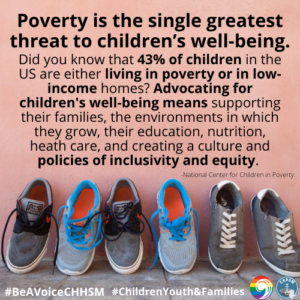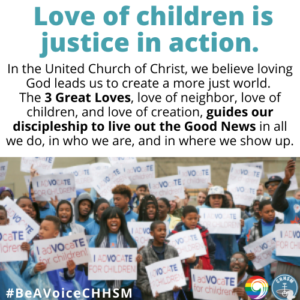Advocacy for Children, Youth, and Families is Toolkit Focus for May

Social media graphics are available as part of the Advocacy Toolkit.
Lauren, 19, had aged out of foster care. Without hope, she had drifted from place to place, living in various shelters or on the streets, sleeping at friends’ houses. Then, a therapist from TAYLRD — part of Seven Counties Services, a community mental health agency based in Louisville, Ky. — encouraged Lauren to go to the women’s campus of The Healing Place, a nonprofit also run by Seven Counties Services. After six months of a safe space to live and additional services from TAYLRD, Lauren received the keys to her own transitional housing apartment.
Lauren’s story is just one example of the many ways CHHSM members minister to the needs of children, youth and families, the focus of this month’s installment of the Be A Voice Advocacy Health and Human Services Toolkit. The toolkit is a joint project of the UCC Council for Health and Human Service Ministries and the UCC Justice and Witness Ministries office in Washington, D.C. It offers historical and current context, helpful questions to ask candidates running for office, and a variety of social media graphics and web resources links.
“We have a responsibility to serve people in our community, no matter what stage of life they are in,” says Abby Drane, CHHSM Board chair and president and CEO of Seven Counties Services and Bellewood & Brooklawn, and the church helps to “extend that intervention to improve someone’s life by providing another level of compassion and care that children, adults, and families need to feel whole again.”
The May installment of the toolkit centers in on the need to nurture and improve the lives of children and youth, which includes supporting not only their families, but the environment in which they grow: their education, nutrition, health care, and safety. It also provides recent statistics on the causes of the inequities children and young adults face, including poverty, racism, and violence.
Some 21 percent of all children in the United States live in families below the federal poverty line. According to the American Academy of Pediatrics, poverty effects everything from chronic illnesses, infant mortality and injury to nutrition, education, mental health, and environmental factors.
 One hidden danger for many youth and young adults is the threat of human trafficking. Recently, Bethany Children’s Home in Womelsdorf, Pa., began work toward state certification in order to offer programming for the prevention of human sex trafficking.
One hidden danger for many youth and young adults is the threat of human trafficking. Recently, Bethany Children’s Home in Womelsdorf, Pa., began work toward state certification in order to offer programming for the prevention of human sex trafficking.
“Our youth are 100 percent at risk of becoming victims of human sex trafficking,” says Joseph Birli, Ed.D., CEO of Bethany. “We are looking to be a safe haven where they can learn how to avoid that trap, as well as heal from such traumatic experiences.”
The certification, which should be completed by fall, will include new initiatives that address the risks of trafficking for youth ages 18 to 21, as well as programs to aid victims in their healing process. The expanded programming also will include training for staff.
Children, youth, and families is one of the advocacy emphases CHHSM’s Board chose during its meeting in Fall 2019, in part because so often children and youth — one of our most vulnerable populations — are not made a priority. Each year, some 4.2 million youth and young adults experience homelessness, according to the National Conference of State Legislatures (NCSL). Racism also is a factor. The Poor People’s Campaign reports that predominantly white school districts receive $23 billion more educational funding than districts serving students of color.
Advocating for children, youth, and families is just one way CHHSM members across the country are responding from a faith-based perspective in order to create a more just, caring and compassionate world.
Join Our Mailing LIst
Follow on Facebook
Iredell Adult Day Services Hosts Ribbon-Cutting to Celebrate Adult Day Health Certification - CHHSM
www.chhsm.org
Iredell Adult Day Services (IADS) in Newton, N.C. — a nonprofit organization dedicated to caring for older adults, vulnerable groups, and their families, and part of EveryAge — hosted a ribbon cut...